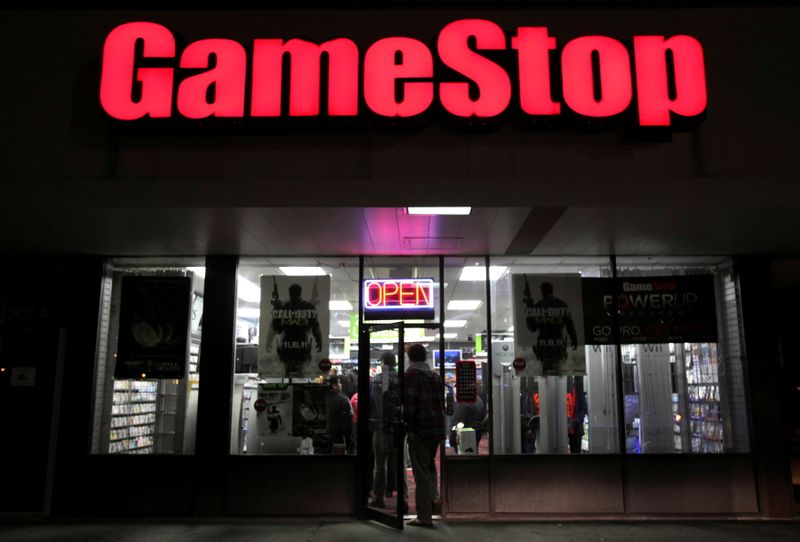What to watch for in the U.S. SEC’s GameStop report By Reuters

© Reuters. FILE PHOTO: People enter a GameStop store during “Black Friday” sales in Carle Place, New York November 25, 2011. REUTERS/Shannon Stapleton/File Photo
2/2
By John McCrank
NEW YORK (Reuters) – The U.S. Securities and Exchange Commission plans to soon release its long-awaited report on the GameStop trading saga and it could have implications for brokerages, wholesale market makers, exchanges, and retail investors.
The SEC report is expected to address the issues around the market chaos in late January when a flood of trading through commission-free retail brokerages drove shares in GameStop Corp (NYSE:) and other popular “meme stocks” to extreme highs, squeezing hedge funds that had bet against them.
Amid the intense volatility, several brokerages restricted trading in the affected stocks, curbing the rally, infuriating retail traders and rattling market confidence.
Here are some topics the SEC has said it is scrutinizing:
THE GAMIFICATION OF TRADING
SEC Chair Gary Gensler has said the “gamification of trading” by commission-free retail brokerages is a growing concern because it could encourage more trading than is in investors’ best interests.
Gensler highlighted retail brokerages’ use of artificial intelligence, predictive data analytics, and machine learning to push customized products to their customers and boost revenues.
In March, brokerage Robinhood (NASDAQ:) Markets scrapped the use of confetti animation on its trading app that had marked users’ first trades, among other changes, following criticism from politicians and regulators.
PAYMENT FOR ORDER FLOW
Gensler has been critical of payment for order flow (PFOF), the practice of retail brokers, like Robinhood or Charles Schwab (NYSE:) Corp, sending most of their customers’ orders to wholesale market makers rather than to exchanges, in return for payments.
Gensler has said PFOF raises potential conflicts and has questioned https://www.sec.gov/news/speech/gensler-global-exchange-fintech-2021-06-09 whether brokers are incentivized to encourage their customers to trade more frequently to maximize the payments.
PFOF proponents say it is a major reason most brokerages were able to stop charging trading commissions, which helped fuel retail trading boom. The majority of Robinhood’s revenue comes from PFOF.
PFOF defenders say it benefits retail traders because wholesale brokers execute their trades at the best prices found on exchanges or better.
But Gensler has said that because so many trades are now executed away from exchanges, where stock prices are formed, the best prices shown on exchanges may not accurately reflect market sentiment, causing wider bid-ask spreads to the detriment of all investors.
MARKET MAKER CONCENTRATION
The GameStop saga highlighted the small number of market-makers that dominate the retail market, with Citadel Securities executing around 37% of all U.S.-listed retail volume https://www.citadelsecurities.com/products/equities-and-options….
Read More: What to watch for in the U.S. SEC’s GameStop report By Reuters
